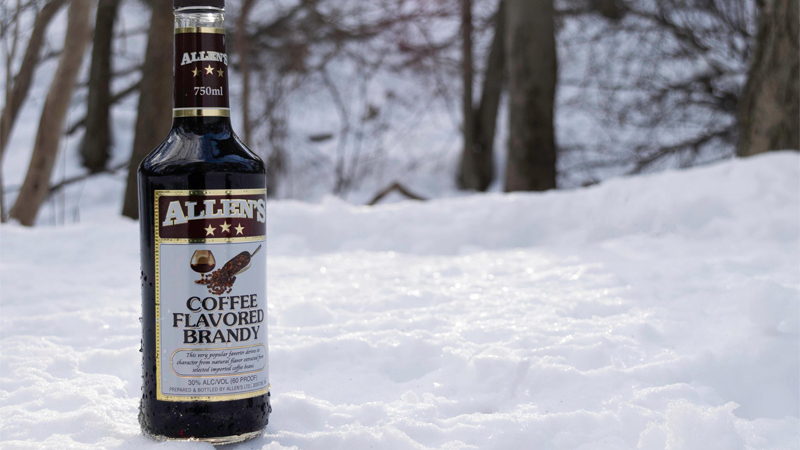It isn’t hard to find a bottle of Allen’s Coffee Brandy in Maine. You’ll find it on grocery store shelves, mixed in the mugs of fishermen’s morning coffee, on the back bars of neighborhood taverns, and littered along snowmobile trails (these bottles are jokingly known as “lilies of the tundra,” due to their necks emerging as the spring sun melts the snow). However, outside of Maine, you are hard pressed to find someone who has heard of Allen’s, let alone holds it in the regard that many Mainers do.
For decades Allen’s Coffee Brandy held the top sales spot in Maine. What’s more, multiple bottle sizes featured in the list of the top 10 best selling spirits in the state. In 2008, there was almost one bottle of Allen’s sold per man, woman, and child in Maine.
Although it is produced in Norwood, Mass., the “Champagne of Maine” has been a decades-long staple in Maine dive bars, locals-only joints, and on every lobster boat. Its popularity has yet to be duplicated elsewhere.
Don’t Miss A Drop
Get the latest in beer, wine, and cocktail culture sent straight to your inbox.
Made from neutral grain spirit, coffee bean extract, and natural sweeteners, it technically isn’t a brandy, but a liqueur. Flavor-wise, Allen’s is pretty straightforward. With the nose of a slightly burnt coffee syrup, it tastes like an incredibly strong cup of joe and coats the palate with a sugary viscosity that hides much of the flavor of alcohol. Not that it’s too wild on that front, either — Allen’s clocks in at 60 proof or 30 percent ABV. The finish is both pleasant and bitter at the same time.

The most common “cocktail” you would find Allen’s in was an equal parts mix with milk. (It’s unclear whether John Lennon ever sampled one, though he surely would have enjoyed it.) The drink enjoyed an array of colorful names depending on where in the state you were ordering it. From the most common, “Fat Ass in a Glass,” to “Liquid Leg Spreader,” it’s easy to understand why Allen’s wasn’t exactly gracing the backs of higher-end cocktail bars until recently.
As the cocktail scene in Maine, and New England, has grown over the last decade, bartenders have started to embrace Allen’s. The most common use has been in many bars’ Espresso Martinis (see below). But you can find drinks that pair Allen’s with tequila or riff on classics like The Revolver, with the traditional coffee liqueur replaced by Maine’s beloved flavored brandy.
Beyond finding its way onto the shelves of ever more modern cocktail bars, Allen’s has been expanding its brand to become more than Maine’s favorite spirit. Three years ago, it released special, limited-edition lighthouse bottles. Each year a new Maine-based lighthouse “bottle” arrives on the market during the busy summer, with Quoddy Head, Bug Light, and Petit Manan having featured previously. Reminiscent of old whiskey decanters that were shaped like the states or landmarks around the distillery, Allen’s clearly understands the growing appeal of its brand.
“Allen’s Coffee Brandy has been a part of the fabric of Maine for decades, acting as a cultural rite of passage between generations of Mainers,” says Gary Shaw, executive vice president of M.S. Walker, the producer of Allen’s. “For years it had been the state’s No. 1 selling spirit, enjoyed in traditional Sombreros, White Russians, or in coffee. It is exciting to see a new generation discovering ways to enjoy Allen’s. Its unique natural coffee flavors are perfect for contemporary cocktails like Espresso Martinis.”
Can something like Allen’s, which is insanely popular but still super regional, become a national phenomenon too? It is a big ‘ol yes, according to Hayley Wilson, bartender and co-founder of the pop-punk pop-up Jimmy Drinks World. “Before I moved to Maine I had never heard of Allen’s Coffee Brandy but if Jeppson’s Malort can do it, so can Allen’s,” she says. “I think with the help of bartenders spreading the good word to guests and coworkers alike, Allen’s can become the household staple it deserves to be.”
Hunt + Alpine’s Espresso Martini Recipe
Jackson Cannon, of Eastern Standard in Boston, called this version “the greatest Espresso Martini of all time.” He even added this version to Island Creek Oyster Boston’s cocktail menu. Created by Andrew Volk of the Portland Hunt + Alpine Club (full disclosure, Andrew and I are married) when the bar first opened in 2013, this version doesn’t need an espresso machine and also swaps out vodka for rum and, of course, Allen’s Coffee Brandy. The Allen’s brings the bitterness that makes up for not having an espresso machine on hand to pull shots. Easy to make at home, this version still remains one of the Hunt + Alpine’s best-selling cocktails year-round nine years later.
Ingredients
- 2 ounces sweetened coffee concentrate (bought or homemade)
- 1 ounce Allen’s Coffee Flavored Brandy
- 1 ounce white rum, such as Plantation 3 Star
Directions
- Add the coffee concentrate, Allen’s, and rum to a mixing tin.
- Add ice to the tin, cap, and shake hard for 30-45 seconds.
- Fine strain into a chilled cocktail glass and enjoy immediately.


